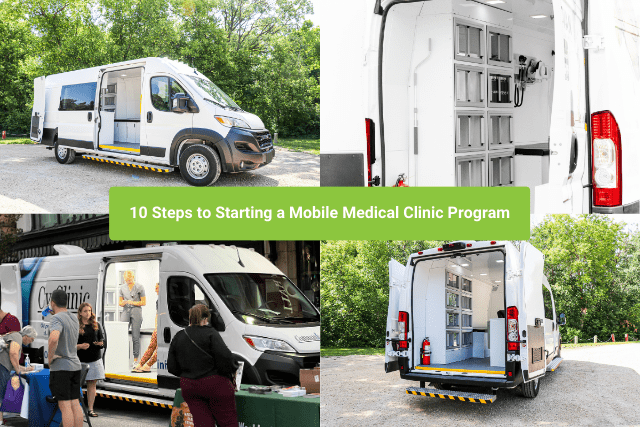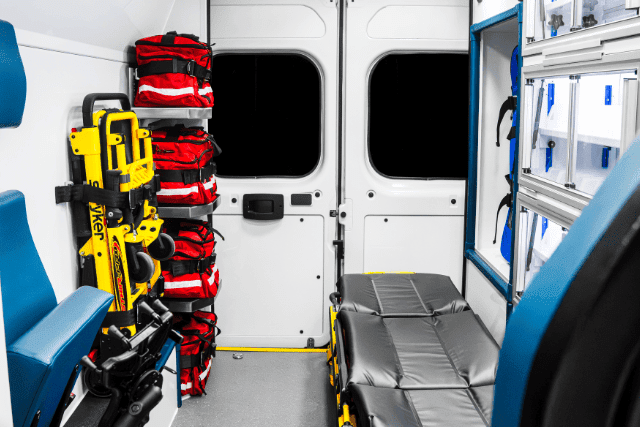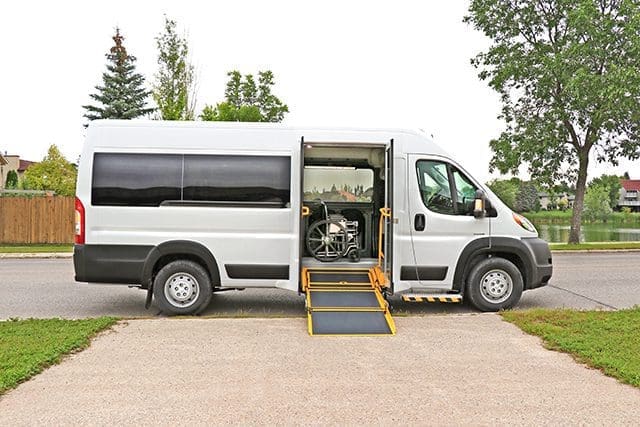Starting a mobile medical clinic in Canada can come with several challenges. A few of the more common ones your organization might face are securing funding, finding the right mobile medical clinic manufacturer, identifying and reaching the right communities, and recruiting and training the right healthcare professionals for the clinic.
At MoveMobility, we’ve been manufacturing mobile medical vehicles for organizations that have the goal of reducing barriers to healthcare for people for well over a decade. All of our vehicle modifications are certified and approved by Transport Canada. Each modified vehicle also has the National Safety Mark on it. In addition, we’re one of Canada’s only two Ford Qualified Vehicle Modifiers.
With our experience in the industry, we know how frustrating it can be when you’re in the beginning stages of starting a mobile medical clinic. Our goal in writing this article is to ensure you have an easier time with that. By the end of reading, you’ll have a clearer idea of where to begin and what to do along the way.
1. Define your mission
Starting a mobile medical clinic in Canada is a noble endeavor that can make healthcare more accessible to many people. Your first step (and often the most important one) is defining your mission. Try to think of your mission as your compass.
- What type of healthcare services will you provide?
- Who will benefit from your services?
- What area of Canada will you cover?
- How will you measure success?
For example, you might focus on providing vaccinations for remote communities in northern Canada. Your mission could be to “Ensure every child in northern communities receives essential vaccinations to prevent diseases.”
Beyond your immediate mission, you also need to consider your long-term vision for the mobile medical clinic. How do you see your clinic evolving and expanding over time? An example of a long-term vision is to establish a network of mobile clinics across Canada to provide comprehensive healthcare access.
2. Market research
In Step 2, you dive into market research to find the perfect communities in Canada where your mobile medical clinic can make the most impact. It’s a bit like searching for the best fishing spot – you want to find the right place.
Market research helps you understand the needs of different communities. It tells you where people need your healthcare services the most. This step is all about making informed decisions.
Look at various communities in Canada and their unique healthcare needs. Consider factors like population, healthcare facilities, and accessibility to healthcare. For example, you might find a remote northern community with limited healthcare resources that could benefit greatly from your clinic.
3. Research regulations
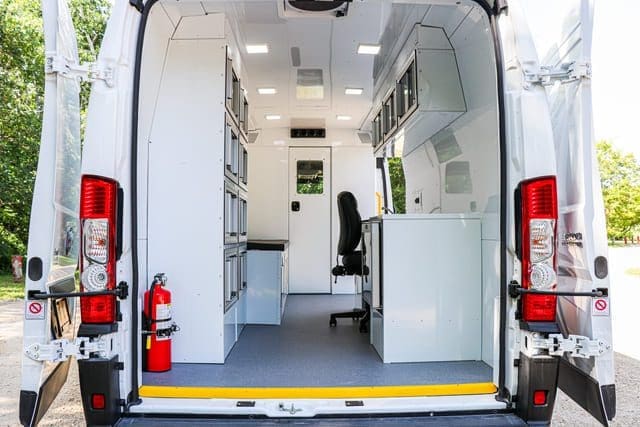
When starting a mobile medical clinic in Canada, it’s important to understand the rules and regulations. These are the laws and guidelines that make sure your clinic runs safely and legally.
Healthcare regulations are like a set of rules that help make sure patients are safe and well-cared for. In Canada, these rules can differ from one place to another because each province and territory can have its own healthcare laws.
Here are some regulations you should know about:
Health and safety standards: Your clinic should be a safe and clean place for patients and staff. Regulations specify how to handle medical waste and keep everything clean.
Privacy laws: In Canada, we take patient privacy seriously. There are laws (like the Personal Information Protection and Electronic Documents Act or PIPEDA) that protect people’s personal medical information. You’ll need to follow these laws to keep patient records safe.
In various locations, regulations dictate who can operate a mobile medical van. Depending on your area, obtaining specific licenses and approvals may be necessary for lawful operation. Similar to how food trucks must pass health and safety inspections periodically, complying with these regulations ensures the proper functioning and safety of your mobile medical van.
Regulations can sometimes be frustrating to navigate. You should start by checking with your local health authority to make this step go smoothly.
4. Secure funding
Now, let’s talk about the money you need to bring your mobile medical clinic to life. Funding is the engine that drives your mobile medical clinic and brings your healthcare dream to life.
You’ll need funding for things like buying the right mobile medical van, getting medical equipment, and paying your team if it’s not a volunteer-run clinic. Without funds, your clinic can’t get off the ground.
There are a few ways to get the money you need:
Grants: These are like gifts of money for a specific purpose. Look for grants from government programs, charities, and healthcare foundations.
Donations: People and organizations might donate money to support your cause. Share your mission and ask for help. You can use platforms like GoFundMe to help with that.
Partnerships: Team up with local healthcare providers or community organizations. They can help with funding and resources.
Philanthropy in action: Harness the power of philanthropy by engaging with individuals and organizations passionate about making a difference in healthcare. Philanthropic support can play a huge role in bringing your mobile medical clinic to life.
5. Choose a suitable vehicle manufacturer
Choosing the right vehicle for your mobile medical clinic is a bit like selecting the perfect tool for a job. It’s all about having the right fit for your healthcare mission. Your vehicle is your clinic on wheels. It’s where you’ll see patients and provide medical care. The type of vehicle you choose can affect how well you can serve your community.
At MoveMobility, we offer four types of mobile medical vans that can be modified depending on your needs and what type of healthcare you’re offering your patients. The right manufacturer ensures your mobile clinic is safe and does its job.
6. Customize the interior
Now, let’s talk about what goes on inside your mobile medical clinic. The interior is where you’ll examine patients, store medical equipment, and interact with the people you serve. It needs to be well-organized for efficiency and comfortable for patients.
The interior of a medical van can be customized to match the specific needs of your healthcare program. Take a look at the table below to see what you get with our Mobile Medical Clinic Van at MoveMobility. The custom equipment column includes some additional options you can get in your van.
| Medical van layout | Custom equipment | Mobile office space |
| Exam bed with firm vinyl mattress | Sink | Spacious desk |
| Under-bed storage | Fridge | Office chair |
| Floor-to-ceiling and overhead cabinets for medicines and supplies | Additional power supply | Sink |
| Office desk space | Cab divider | Fridge |
| High capacity heat & A/C | Overhead lighting for a clean work environment | |
| Rear compartment lighting | Rolling office chair secure during travel | |
| Anti-slip steps | Bright LED lighting for a safe, comfortable work environment |
7. Assemble your team
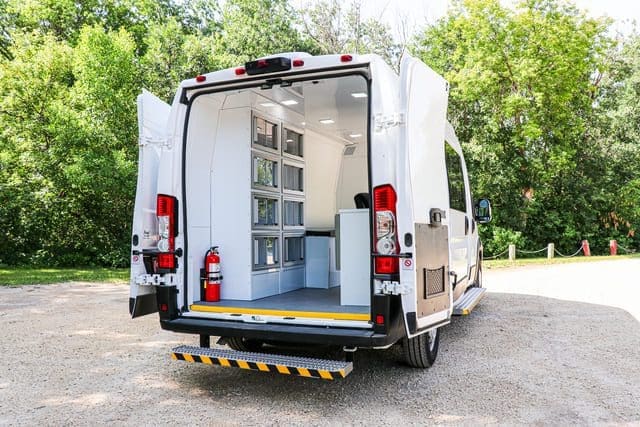
Your team will be the heart and soul of your clinic, providing the care and support that your community needs. They can include doctors, nurses, pharmacists, and administrative staff. Each team member plays a crucial role in delivering healthcare services effectively.
It’s important to ensure that your team has the skills and training required to work in a mobile setting. This might be different from what they’re used to in a traditional clinic. For example, they should be comfortable working in a smaller space and handling the challenges of a mobile clinic.
Teamwork is key. Your team needs to collaborate, communicate, and support each other to provide the best care possible. Effective teamwork will help your mobile clinic run smoothly and deliver quality healthcare services.
8. Outreach and promotion
In Step 8, you’ll focus on outreach and promotion to let people know about your mobile medical clinic. It’s like telling everyone about an exciting event – you want to create awareness and excitement. There are a few ways you can go about this.
Community engagement: Engage with the communities you plan to serve. Collaborate with local leaders, community organizations, and healthcare providers. This involvement can help build trust and ensure your services meet community needs.
Local and social media: Use local media and social media platforms to promote your mobile clinic. Share success stories, patient testimonials, and upcoming events. This helps create a buzz and attract patients.
Events: Participate in local events and fairs to connect with potential patients face-to-face. You can offer health screenings or information about your services. It’s a great way to make personal connections.
Decals for promotion: Consider using eye-catching decals on your mobile clinic to promote it visually. A well-designed logo and clear information on the van can attract attention and help spread the word about your healthcare services.
9. Quality assurance
Step 9 is all about ensuring your mobile medical clinic provides safe and high-quality healthcare services to your target community. It’s like fine-tuning an instrument to play in perfect harmony to create great music.
Quality standards: Establish clear standards for your clinic to ensure that every patient receives the best care. These standards cover everything from medical practices to cleanliness. These are commonly referred to as standard operating procedures.
Safety first: Implement safety protocols to keep both patients and staff safe. Equip your clinic with first aid supplies and provide training to handle any unexpected situations that may arise.
Ongoing safety audits: Regularly evaluate your clinic’s performance to ensure that quality and safety are maintained. This ongoing process helps you identify areas for improvement.
This step is important to follow before the final step. It makes sure you’re meeting the healthcare needs of your community while building trust and credibility. It’s about making sure every patient receives top-notch care in a secure and professional environment.
10. Launch and evaluate
Step 10 is all about the exciting moment when you launch your mobile medical clinic and start serving the community. It’s like the first day of school – a blend of enthusiasm and learning.
Launching your clinic marks the beginning of your mission. It’s the point where you put your plans into action, and real people start benefiting from your services.
Once you’re up and running, it’s essential to keep a close eye on how your clinic is doing. Gather feedback from patients and your team. Use this information to make improvements and ensure that your clinic meets the community’s healthcare needs effectively.
As you gather feedback and evaluate your operations, be ready to adapt and make necessary changes. This flexible approach helps your clinic grow and evolve to better serve the community.
Launching your clinic is a significant milestone, but it’s just the beginning of your journey. Make sure that your organization is continuously learning, adapting, and improving. This ensures that your mobile clinic remains a valuable resource for the community, delivering healthcare that truly makes a difference in people’s lives.
Moving onward: your next steps with MoveMobility
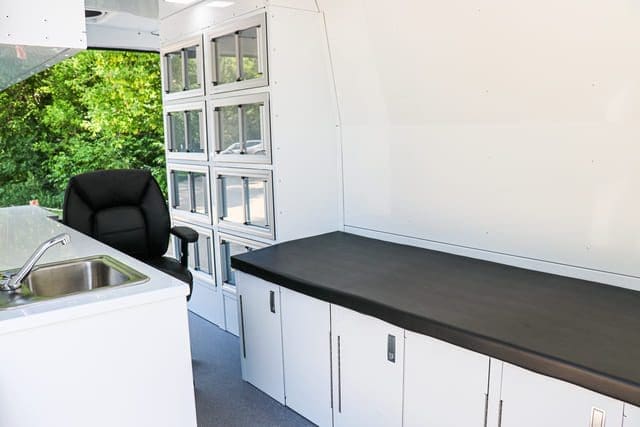
You came to this article maybe feeling a little overwhelmed on how to start a mobile medical clinic.
If you’ve made it this far, you now have a better idea about the 10 steps to starting a mobile medical clinic in Canada.
If you’re still experiencing some hesitation on any of these steps and how to proceed with starting a mobile medical clinic, talk to a MoveMobility expert today.
Read our article on how an Alberta community transformed its health service with a Mobile Clinic Van.
You should also check out our article on how much a mobile medical van costs to give you a better idea of what funding you might need.


